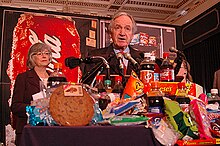Tom Harkin
Thomas Richard Harkin (born November 19, 1939) is an American lawyer, author, and politician who served as a United States senator from Iowa from 1985 to 2015.
His father, Patrick Francis Harkin, an Irish American,[3] was a coal miner, and his mother, Franciska Frances Valentine (née Berčič), was a Slovene immigrant[4] who died when he was ten.
[6] Harkin attended Iowa State University on a Navy ROTC scholarship and became a member of Delta Sigma Phi fraternity.
Harkin was stationed at Naval Air Facility Atsugi in Japan, where he ferried aircraft to and from the airbase that had been damaged in the Vietnam War and in operational and training accidents.
Harkin published photographs he took during the trip and a detailed account of the "Tiger cages" at Côn Đảo Prison in Life Magazine on July 17, 1970.
In 1972, the same year that he graduated from law school, Harkin returned to Iowa and immediately ran against an incumbent Republican Congressman, William J. Scherle.
Scherle represented the southwestern portion of Iowa, which (with one brief exception) had not elected a Democrat to Congress since the end of the Great Depression.
In 1984, Harkin won the Democratic nomination for the United States Senate and defeated freshman Republican Roger Jepsen by 152,502 votes.
[11] Notably, he spent his entire tenure as Iowa's junior Senator, due to his colleague Chuck Grassley having served in the chamber since 1981.
He and Grassley had a fairly good relationship, despite their often sharp ideological differences, and their seniority made Iowa influential in national politics.
Senators Dick Lugar, Tim Johnson, Byron Dorgan, Joe Biden and Norm Coleman), introduced the BioFuels Security Act (S. 2817/109th) on March 16, 2006.
[16][17] On July 16, 2013, Harkin introduced the Cooperative and Small Employer Charity Pension Flexibility Act (S. 1302; 113th Congress) into the Senate.
[21] The bill would amend the Fair Labor Standards Act of 1938 (FLSA) to increase the federal minimum wage for employees to $10.10 per hour over the course of a two-year period.
"[28] During his political career, Harkin has generally supported the Supreme Court ruling Roe v. Wade, which decided that a right to privacy under the due process clause in the Fourteenth Amendment to the United States Constitution extends to a woman's decision to have an abortion.
He has opposed most efforts to place legal restrictions on Roe v. Wade, including voting against a ban on late-term abortion, while supporting contraception and education to reduce teen pregnancy.
[29] He was very critical of the Stupak-Pitts Amendment, which places limits on taxpayer-funded abortions in the context of the November 2009 Affordable Health Care for America Act.
[31] In July 2006, Harkin made a speech from the Senate floor in response to George W. Bush's veto of the embryonic stem cell research federal funding bill.
[34][35] In September 2014, Harkin was one of 69 members of the US House and Senate to sign a letter to then-FDA commissioner Sylvia Burwell requesting that the FDA revise its policy banning donation of corneas and other tissues by men who have had sex with another man in the preceding 5 years.
Senator Herbert Kohl, sponsored a voluntary agreement by major players in the cocoa and chocolate industry signed in 2001 and often referred to as the Harkin–Engel Protocol.
[41] The purpose of this "Protocol for the growing and processing of cocoa beans and their derivative products" was to bring practices in West Africa into line with Convention 182 of the International Labour Organization concerning the prohibition and immediate action for the elimination of the worst forms of child labor.
In retrospect he believes the Democratic-controlled Senate and House should have enacted a single-payer healthcare system or a public option to give the uninsured access to government-run health plans that compete with private insurance companies.
[citation needed] As of 2010[update] he was the third-largest career recipient of pro-Israel Political Action Committee contributions in the Senate.
Harkin won the Iowa caucus and those in Idaho and Minnesota (with help from Senator Paul Wellstone), but he ran poorly in New Hampshire and other primaries and ultimately lost the Democratic Party nomination to Governor Bill Clinton of Arkansas.
She served as a deputy counsel for the U.S. Department of Agriculture before joining the Washington law firm of Akin Gump Strauss Hauer & Feld in 1983.
In 1993, President Bill Clinton named her chairman and chief executive officer of the Overseas Private Investment Corporation (OPIC).




